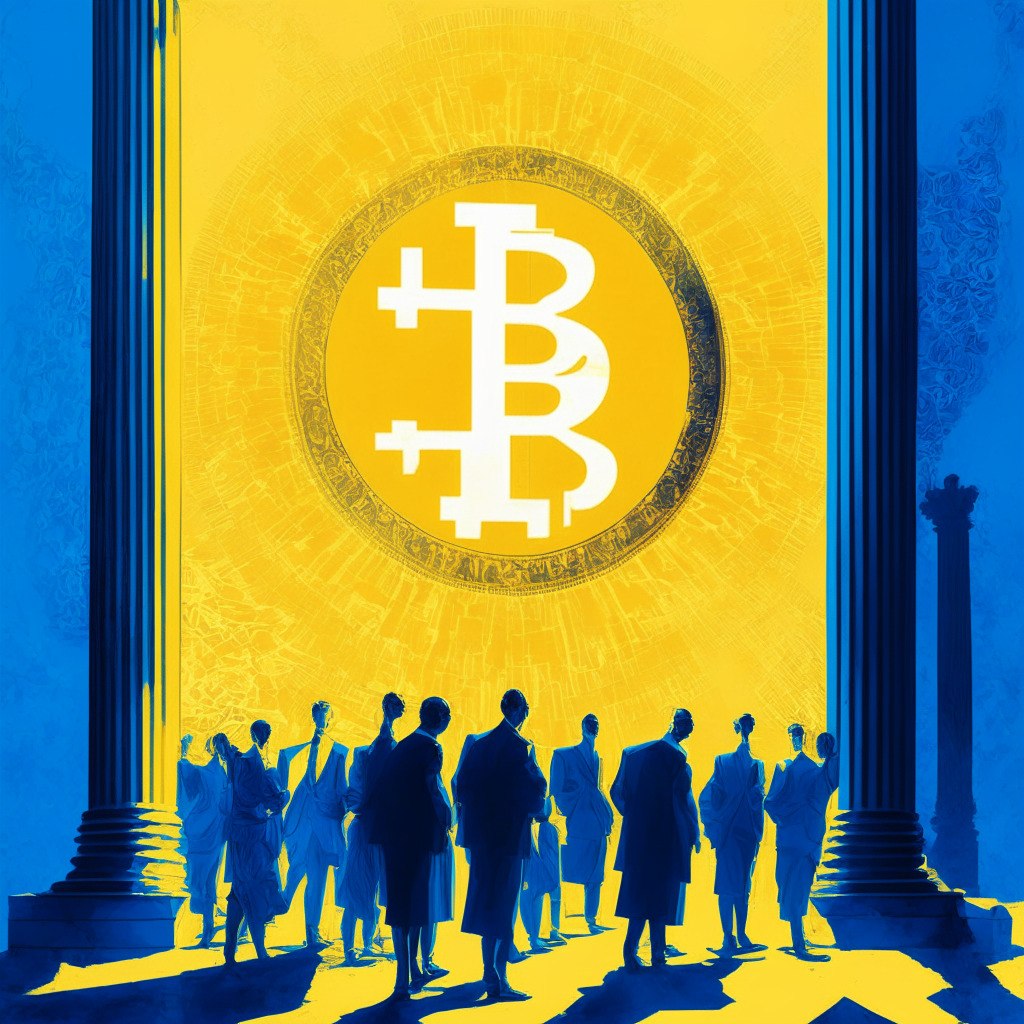“Both sides of the Congress are urging the SEC to approve Bitcoin ETFs, stressing the need to balance investor protection and allowing innovation. However, the SEC has delayed its decision, raising concerns. The article also highlights Bitcoin price prediction and mentions 15 alternative cryptocurrencies to watch in 2023.”
Search Results for: RSI
Crypto Collision: As Binance Hits Regulation Wall, Is a New Era Dawning for Cryptocurrencies?
“The decentralised nature of cryptocurrencies is colliding with regulatory restrictions, as evidenced by Binance’s recent challenges. Big payment providers like Paysafe are halting operations, reflecting the global shift in the crypto industry towards greater regulatory scrutiny. However, it remains unclear whether this increased regulation will help or hinder the market’s organic growth.”
Gary Gensler’s Regulatory Tightrope: Balancing Innovation and Regulation in Cryptocurrency
The SEC under Gary Gensler’s leadership has been accused of regulatory overreach, hampering the U.S. capital markets. While many criticize the lack of clear regulations around cryptocurrencies and other novel financial instruments, Gensler refrains from concrete classification, highlighting the complexity of these emerging issues.
Unraveling the Winklevoss-Genesis Saga: Lessons from a $280M Withdrawal Amid Bankruptcy Filings
“The Winklevoss-owned Gemini withdrew roughly $280 million from Genesis Global just prior to a withdrawal freeze and bankruptcy filing. With legal battles involving Genesis, Gemini, and their parent company DCG, this situation highlights the need for tighter cryptocurrency regulations.”
The Lure and Perils of Imminent Ethereum Futures ETFs Launch Amid U.S. Shutdown Fears
Bloomberg analysts predict the launch of Ethereum futures exchange-traded funds (ETFs) in the US, possibly accelerated by a potential government shutdown. The SEC might permit various Ethereum futures ETFs to launch next week. Despite previous failed attempts, analysts give a 90% chance of launching this October, but regulatory complexities and uncertainties remain a concern in the crypto market.
Kraken Crypto Exchange’s Brave New Leap: Stocks and ETFs By 2024
San Francisco’s crypto exchange Kraken is reportedly considering introducing stock and ETFs on its platform, marking the first crypto exchange to expand past cryptocurrencies. Given the target year of 2024, these additions could flag a new era in trading platforms. Despite challenges, if successful, this could serve as a benchmark for other crypto exchanges to diversify asset classes.
Regulatory Tug-of-War: The SEC, Blockchain, and the Struggle to Control Crypto Assets
“SAB 121, the SEC’s new regulatory bulletin concerning crypto assets, faces criticism and controversy. Issued without involving key industry bodies, this document has stirred skepticism due to its broad implications for digital asset custody, inherent risks, and the broader crypto space.”
Kraken’s Leap into Stock Trading: A Bold Move or a Risky Venture?
“Kraken, a crypto exchange, is reportedly considering a venture into US stock trading, planning to launch its stock trading services in the US and UK in 2024, despite legal and regulatory challenges. The move indicates a potential significant diversification for platforms typically exclusively focused on digital assets.”
Bitcoin’s Volatility: Can Smaller Yield-Bearing Platforms Balance the Risk?
Bitcoin’s price volatility is prompting investors to explore alternative coins like Bitcoin Minetrix which features stake-to-mine, yielding potential income while mitigating capital risk. However, potential issues at Binance exchange could negatively impact Bitcoin prices, emphasizing the importance of diversification in blockchain investments.
Leap into Blockchain Future: Chainlink Incorporates CCIP into Coinbase Layer 2 Network
Blockchain oracle network, Chainlink, has integrated its Cross-Chain Interoperability Protocol (CCIP) into the Coinbase layer 2 network, Base, enabling developers to create web3 products and launch transactions across different networks. This step advances the adoption of innovative crypto products, as Chainlink’s move towards cross-chain lending expands. However, the challenge of potential centralization criticism remains.
Crypto Regulatory Suspense: SEC’s Stance, Stakeholder Worries, and an Uncertain Future
“The U.S. House Financial Services Committee may subpoena the SEC over undisclosed documents related to FTX’s former CEO. The Committee claims the SEC’s lack of cooperation is compromising transparency and hindering digital asset ecosystem growth. This case demonstrates how regulatory bodies are scrutinizing the digital asset industry.”
Bullish Sentiments as ThunderCore Ascends and Launchpad XYZ Maps the Web 3.0 Terrain
“ThunderCore cryptocurrency exhibits an optimistic outlook with its recent 14% climb and trending positive market activity. Meanwhile, blockchain startup Launchpad XYZ is attractively streamlining the Web 3.0 industry, including NFTs and play-to-earn games, and preparing for its token’s debut on its decentralized exchange in 2023.”
Dwindling Dominance: Binance Market Share’s Alarming Plunge amidst Regulatory Heat
“Binance, a major player in the crypto space, has seen a notable decline in market share among non-dollar crypto exchanges. Co-founder, Yi He, has urged employees to focus on product conceptualization and improving client experiences, disregarding regulatory pressures and competitors’ expansions.”
Binance’s Exit and CommEx’s Entrance: The Mysterious Shift of Crypto Operations in Russia
“Binance has exited Russia, selling to newcomer CommEx. Despite little detail about CommEx’s origins, it is registered in Seychelles serving CIS and Asian clientele. Its initial focus is on P2P transactions in Russia with goals to rapidly expand as a cryptocurrency exchange.”
Moonbeam’s Surging Trend and the Hype around TG.Casino’s Presale: Investment Prudence Required
Moonbeam, a key player in the Polkadot ecosystem, experiences a 17% price increase ahead of its anticipated incentive program, which is expected to boost activity within the network. The upcoming Moonbeam Ignite program aims to distribute 12 million GLMR tokens, resulting in a 71% increase in token price over a week.
Unraveling Mt. Gox: Chainalysis and the Future of Crypto Tracing Technology
“The Mt. Gox collapse sparked the development of solutions like Chainalysis for tracing illicit fund movements in the crypto industry. Despite success and controversy, Chainalysis has aided in the recovery of hacked funds and played a significant role in solving complex crypto movements, indicating the increasing effectiveness and importance of such tools in the evolving crypto landscape.”
Surviving the Crypto Bear Market: An Insight into the Inevitability of Web3 Revolution
“Web3 revolution signals an era of decentralization, authentic digital ownership, and self-sovereignty. Despite bear markets in the crypto sphere, projects with firm fundamentals and long-term visions prosper, contributing to a more inclusive, transparent digital future. Decentralization penetrates arenas like healthcare, entertainment, and supply chains, affirming the essentiality of this trajectory.”
How Mixin Network’s $20 million Bounty on its Own Breach Shapes Crypto Security Future
After losing $200 million in digital assets to a cybercrime exploit, Hong Kong-based Mixin Network is offering a $20 million bug bounty to the perpetrator. The company swiftly disabled user services after the breach, before working on resolving detected vulnerabilities to uphold user security and platform integrity. Mixin Network’s ability to handle this event highlights the significance of firm-level security in the unregulated world of cryptocurrencies.
Binance’s Euro Crisis: The Impact of Regulatory Scrutiny on Crypto Exchanges Future
Binance, the largest crypto exchange, is facing regulatory challenges in Europe, especially in France, after its partnership with digital payment services provider, Paysafe, expired. With no banking partner, Binance France advised users to convert any fiat money they hold into crypto while the company seeks a new partnership. This situation highlights the need for crypto exchanges to comply with financial regulations to avoid service disruptions and maintain user trust.
Shiba Inu Struggles Amid dips: A Glimpse at Market Factors and Emerging Competitors
“Shiba Inu (SHIB) has faced a drop in trading value despite the introduction of the Shibarium network. However, its oversold state and below-average market indicators hint at a possible uptrend. Meanwhile, Meme Kombat (MK), leveraging meme popularity, hints at an era worth exploring in the crypto world.”
Decoding Terra Luna Classic’s Potential Turnaround: Governance Proposals and the Rise of New Altcoins
The Terra Luna Classic cryptocurrency sees encouraging performance following the endorsement of governance proposals aimed at slowing USTC minting and suggesting a burn of this stablecoin. This could potentially re-peg the value of USTC and initiate LUNC’s recovery rally. Increasing short-term support hints that LUNC may soon bounce back, if said proposals are effectively implemented.
Swiss Bank Joins Crypto Exchange – A Bold Leap or Risky Venture?
“Hypothekarbank Lenzburg, a Swiss bank with over $7 billion in assets, will join the Central Securities Depositary of SDX crypto exchange. This expands the bank’s role in digital assets including token issuance, digital value rights listings, and custody, bolstering its presence in the thriving crypto market.”
Taiwan’s Crypto Sector Shake-Up: Empowering Security and Trust Through New FSC Regulations
Taiwan’s Financial Supervisory Commission (FSC) introduces fresh directives for Virtual Asset Service Providers (VASPs) to improve cryptocurrency users’ security. Guidelines demand a clear separation of company and customer assets, increased transparency, fortified internal controls within crypto firms, and adherence to robust anti-money laundering mechanisms. These regulations aim to encourage self-regulation in the crypto industry.
Regulation in Crypto: Spotlight on FTX Founder’s Trial and its Impact on Future Frameworks
“The case against Sam Bankman-Fried, founder of crypto exchange FTX, exemplifies the increasing relevance of regulation in the crypto world. Legal proceedings reveal his political donations to be admissible, offering insight into alleged misuse of FTX customer funds. Additionally, Bankman-Fried’s involvement in creating and allegedly manipulating FTX Token prices illuminates broader concerns of fraudulent token price manipulation within the crypto industry.”
Shifting Sands: How Stringent Crypto Regulations Impact the Future of Exchange Platforms in Europe
“Crypto exchange Gemini discontinues its services in the Netherlands due to stringent regulations instituted by the Dutch central bank. Gemini intends to comply with the Markets in Crypto-Assets Regulation (MiCa), before reopening for Dutch users. These regulatory tightening trends raise questions about the future of crypto platforms in the European Union.”
Decoding the Maze: Blockchain Finance, Sanctions and the Eternal Cat-and-Mouse Game
The US Department of Treasury has imposed sanctions on an Ethereum-backed cryptocurrency wallet linked to an international drug trafficking organization, highlighting renewed governmental attention towards illicit activities facilitated via blockchain. This saga exposes pitfalls and successes in the fight for blockchain transparency and safety.
Pros and Cons of the SEC’s Extended Review Period on ARK 21Shares’ Bitcoin ETF Proposal
The Securities and Exchange Commission (SEC) has delayed its decision on a BTC ETF from ARK 21Shares till January. This delay raises questions about when crypto ETF approvals will arrive in the US. Despite increasing interests, no spot BTC ETF has been approved yet. Members of Congress urged the SEC to approve Bitcoin ETFs, arguing against discrimination on spot bitcoin traded products. The crypto community eagerly awaits the SEC’s final decision, marking January 10, 2023, in their calendars.
Unraveling Stablecoins: Booming Assets or Impending Crisis?
“This report by the United States Federal Reserve Banks reveals the potential impact of stablecoins on the economy. Highlighting the similarity between stablecoins and money market funds, it warns of the vulnerabilities these coins face during market downturns. Issues like risky backing collateral and erosion of investor confidence can lead to substantial losses.”
Expanding the Stablecoin Universe: Circle’s EURC Now on Stellar Network
Stablecoin issuer Circle has introduced a new version of its euro-backed stablecoin, EURC, now available on the Stellar network. This innovation offers users the ability to handle business via blockchain networks in local currencies. However, converting blockchain transactions into local currencies remains complicated, highlighting the integration challenges that the blockchain community faces.
Navigating PEPE Token Volatility: An Uplift or New Lows on the Horizon?
“The PEPE token is currently at a pivotal point, hovering around its 20-day EMA, indicating potential uptrends despite previous lows. The future of PEPE depends on market responses to resistance levels. Meanwhile, Launchpad XYZ, a Web 3.0 development platform, brings stability amidst market uncertainty, offering features like analytics, token swaps, and ICO access.”
Bounty for Hackers: An Unconventional Solution to Crypto Exchange Security Breaches
“After a security breach resulting in an $8 million loss, cryptocurrency exchange HTX reassured users about their deposits’ safety, marking the continuing debate over crypto market security. Shareholder Justin Sun responded unorthodoxly, offering a bounty to the responsible hacker and hinting at hiring them as a security advisor.”
Federal Reserve Concerns: Stablecoins’ Instability or the Next Financial Evolution?
“Federal Reserve Banks express concern that stablecoins could introduce instability into the financial system due to lack of standard regulatory framework. The Central Bank of Italy reinforces stablecoins’ unstability and presses for international regulatory body to govern cryptocurrencies. Despite risks, blockchain-based cross-border payments show promise of cost-effective solutions.”































